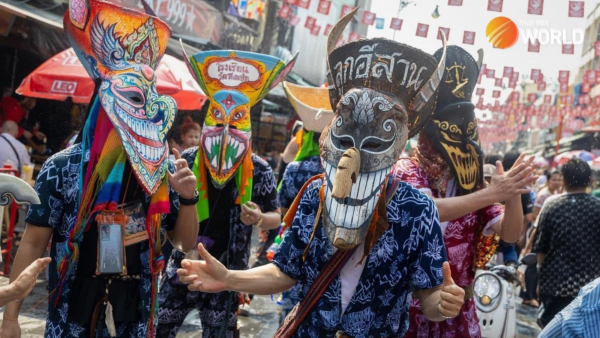Thailand’s royalist old guard have yet to gain momentum

As nationwide anti-establishment protests gather momentum, a counter movement launched by royalists is garnering far less attention and seems to be attracting criticism as much as support.
Political pundits are divided over whether the latter could evolve into a bigger and stronger movement in the future.
More than 1,000 people joined a rally organized by newly established pro-royalist group Thai Pakdee (Loyal Thai) on August 30 in the largest counter-protest in response to anti-government rallies led by students.
The students are calling for dissolution of Parliament, a new Constitution and an end to harassment of government critics. Some are even calling for reform of the monarchy, a taboo topic in Thailand given a law that punishes royal insults with up to 15 years in jail.
Thai Pakdee was founded in mid-August by Warong Dechgitvigrom, a former Democrat MP and veteran politician who said he felt the monarchy was under attack. Other prominent hard-line royalists who joined the group included singer Haruthai “Au” Muangbunsri and Mongkulwattana hospital director Maj-General Rienthong Nanna.
At its first rally in Bangkok’s Din Daeng Youth Centre, the group countered the student movement’s calls with three demands of its own – no dissolution of Parliament, maximum legal action against anyone who seeks to topple the monarchy, and no change to the Constitution. They also called on the Education Ministry to shut down protest sites on campuses, claiming that academics opposed to the monarchy were “brainwashing” students.
Thai Pakdee has allied with at least six groups, including the Coordination Centre for Vocational Students and People Protecting the Monarchy and the multicolour-shirt movement led by Chulalongkorn medical lecturer Tul Sittisomwong, formed to counter red-shirt protests against the Abhisit Vejjajiva government in 2010. It has also urged fellow citizens to join its campaign.
Reactionary movements like pro-royalist and pro-government groups usually fail to gain the support enjoyed by movements fighting the powers-that-be, like youth-led protests, said Yuthaporn Issarachai, a political scientist from Sukhothai Thammathirat Open University.
“It’s not easy to gain momentum. The battle of youth-led protesters is about ideology and liberty but the pro-establishment group is just fighting against their opponents,” he explained.
In his view, the pro-royalist group’s demands are outmoded and not progressive. Also, their core leaders are old-fashioned politicians and lack charisma to impress or convince the public. Moreover, their speeches at the rally drew criticism and controversy rather than sympathy, and were mocked by their opponents.
On the stage, Haruthai accused western countries of wanting to destroy and weaken the Thai monarchy by supporting anti-government protests. The US Embassy in Bangkok later dismissed these allegations and urged all political sides to engage in peaceful debate.
The singer also alleged that US Senator Elizabeth Warren had spoken out about Thai democracy, a claim that drew ridicule after being revealed as fake news by netizens.
“Those aspects affect the credibility of the movement itself. It’s no surprise that it has failed to impress onlookers and even people affiliated with this group in the past,” said Yuthaporn.
The academic was referring to supporters of yellow-shirt protests in 2006-2008 and People’s Democratic Reform Committee rallies in 2013-2014 to oust prime ministers Thaksin and his sister Yingluck Shinawatra respectively.
Meanwhile, participants at the anti-government protests are mainly young students, while those at Thai Pakdee rallies are mostly older people in well-organized groups.
“Now they [the pro-establishment protesters] are older and fewer in number. Also, their ideology or thought may have changed from the old days. And, physically, it may be difficult for them to come out and join the counter movement rally,” said Yuthaporn.
Majority still silent
However, Stithorn Thananithichot, a political scientist from King Prajadhipok’s Institute, said it was too early to conclude that the pro-royalist movement had failed to attract supporters. Indications from their first rally and apparent lack of social-media support could be misleading, he cautioned.
He believed supporters would emerge when they believed a line had been crossed.
The analyst also pointed out that the two sides used different channels of communication and ways of consuming news.
The older generation in the pro-government and pro-monarchy movement typically use Line chat groups to discuss politics. Debate in this closed groups is visible only to members, meaning their views are hidden from the public gaze.
This differs from the anti-establishment groups, whose young-generation supporters tend to use open platforms like Twitter to express their opinions and follow what’s trending.
This can give a misleading impression that public sentiment is loaded against the establishment, Stithorn said.
“It’s no surprise that on Twitter, the heated debate and feeling of the anti-establishment movement dominates what’s trending. But in fact, sentiment and debate in the pro-establishment Line groups is also very heated, we just never see it,” he added.
Stithorn said many pro-establishment supporters have yet to physically support the movement because they are relying on the government to use legal mechanisms to keep public order.
“But if they think the government is losing control or the [student-led] movement has ‘crossed the line’ on the monarchy issue, I believe they would come out to join the pro-establishment movement,” he said.
He cited examples from previous political rallies – the yellow shirts, red shirts and PDRC drew only a few people in the beginning before gradually gaining momentum in rallies that drew tens and even hundreds of thousands of protesters.
By Thai PBS World’s Political Desk






